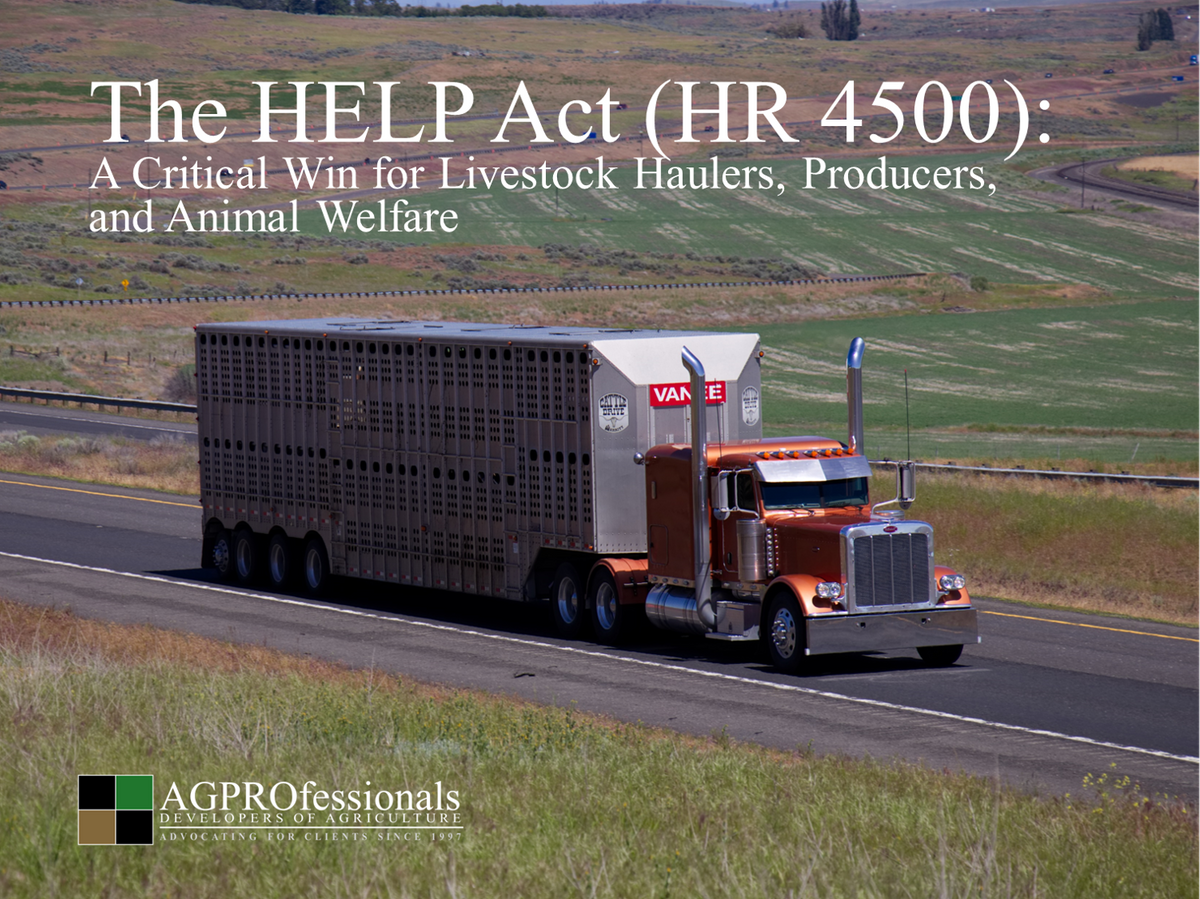The HELP Act (HR 4500): A Critical Win for Livestock Haulers, Producers, and Animal Welfare
Colorado Congressman Jeff Hurd (CO-03) has introduced the Hauling Exemptions for Livestock Protection (HELP) Act (H.R. 4500), a long-awaited piece of legislation addressing the issues around livestock transportation and the Hours of Service and ELD Mandate. It is backed by a broad coalition of agricultural organizations and lawmakers. The bill stands to permanently exempt livestock, insect, and aquatic animal haulers from the restrictive federal Hours-of-Service (HOS) and Electronic Logging Device (ELD) regulations.
As advocates for rural America, AGPROfessionals supports the HELP Act and urges swift passage to safeguard the integrity of the livestock industry, ensure the welfare of live animals in transit, and support the small businesses and drivers that keep our supply chain strong.
A Look Back: How the ELD Mandate Affected Livestock Haulers
In 2018, the Federal Motor Carrier Safety Administration (FMCSA) began enforcing the ELD Mandate, under the Moving Ahead for Progress in the 21st Century Act (MAP-21). This regulation required commercial motor vehicles to install electronic logging devices to track driver hours and limit driving time to prevent fatigue. While well-intentioned for general freight haulers, this “one-size-fits-all” regulation proved to be challenging for livestock transporters.
Hauling live animals is fundamentally different from hauling dry goods. The way the ELD operates, along with delays caused by mandated rest periods and other infrastructure issues, raised concerns about animal welfare related to compliance:
- Heat stress, cold stress, and ventilation issues when trucks must stop in extreme weather.
- Lack of infrastructure as well as appropriate facilities for unloading livestock and keeping them separate from other loads mid-route, exposing animals to injury and disease.
- Additional loading and unloading to meet regulatory requirements for drivers, which are unrelated to animal welfare, causes unnecessary stress on animals.
- Economic losses due to weight shrink and animal stress.
- Public safety risks as drivers are forced to find illegal or unsafe parking to meet regulatory mandates. Drivers are also forced to drive while fatigued to fit their driving time after the ELD starts tracking.
In the face of these challenges, livestock and bee haulers, along with agricultural advocates nationwide, traveled to Washington, D.C. to educate lawmakers on the realities of livestock transport. Temporary exemptions were granted, especially during the COVID-19 pandemic, recognizing that flexibility is vital for humane animal care and a stable food supply.
What the HELP Act Does
The HELP Act (H.R. 4500) answers the need for permanent legislative reform. Here’s what the bill does:
Permanent Exemptions from HOS and ELD
The bill exempts “covered livestock hauling vehicles,” which include trucks carrying livestock, insects, and aquatic animals, from:
- Hours-of-Service limits under Title 49, U.S. Code.
- Electronic Logging Device requirements.
- This exemption applies when animals are loaded, and also when the vehicle is unladen and en route to or from pickups or deliveries.
Broad Definition of Livestock
“Livestock” under the HELP Act includes not just cattle and hogs, but:
- Bees and insects
- Horses
- All living animals raised or harvested for commercial purposes
- Aquatic animals such as farmed fish
This ensures bee haulers, aquaculture producers, and niche livestock sectors are protected.
A United Voice in Support
The HELP Act has received support from a wide array of stakeholders, both in Colorado and nationwide:
- Colorado Cattlemen’s Association emphasized that “you can’t simply stop and take a break” when hauling animals.
- Colorado Wool Growers Association pointed out the critical role airflow and temperature regulation play in animal comfort.
- Colorado Farm Bureau praised the bill for helping mitigate livestock stress and shrink, which directly affects producer profitability.
- National supporters include the National Cattlemen’s Beef Association (NCBA), American Beekeeping Federation, American Sheep Industry Association, and American Quarter Horse Association, among others.
Why It Matters
Passing the HELP Act isn’t just about easing regulatory burdens; it is about preserving the humane, safe, and economically viable transport of livestock. Without the HELP Act, haulers face a lose-lose scenario: comply with laws and endanger animals or risk fines to protect them. As Congressman Hurd aptly stated:
“Livestock haulers have shown, especially during the pandemic, that they can operate with flexibility while maintaining an excellent safety record. The HELP Act simply makes that flexibility permanent.”
This legislation respects:
- The needs of animals in transport.
- The professionalism and responsibility of haulers.
- The economic vitality of the American livestock industry.
AGPROfessionals’ Call to Action
We encourage all those in agriculture to contact your representatives and express your support for the HELP Act (H.R. 4500).
Links
Colorado Congressman Jeff Hurd's Press Release HERE
NCBA Endorsement HERE

